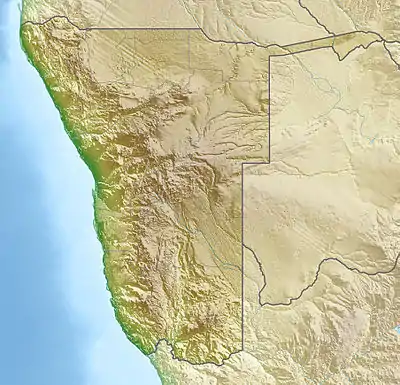Neckartal Dam
The Neckartal Dam, nicknamed the Desert Dragon, is a dam located in the ǁKaras Region of southern Namibia. It is a curved gravity dam on the Fish River near Berseba, c. 40 kilometres (25 mi) northwest of the regional capital Keetmanshoop. Construction started in 2013 and was initially expected to finish in 2017. Since its completion in 2018, it is the largest dam in Namibia, more than three times the capacity of the Hardap Dam upstream. The dam's purpose is to support a 5,000 hectares (12,000 acres) irrigation scheme nearby.[1]
| Neckartal Dam | |
|---|---|
.jpg.webp) Aerial view of Neckartal Dam (2019) | |
 Location of Neckartal Dam in Namibia | |
| Country | Namibia |
| Location | Berseba, ǁKaras Region |
| Coordinates | 26°37′55″S 017°43′04″E |
| Construction began | 2013 |
| Opening date | October 2019 |
| Dam and spillways | |
| Type of dam | Curved gravity dam |
| Impounds | Fish River |
| Height | 80 m (260 ft) |
| Length | 518 m (1,699 ft) |
| Reservoir | |
| Total capacity | 880×106 m3 (1.15×109 cu yd) |
| Catchment area | 45,365 km2 (4,536,500 ha) |
| Surface area | 25 km2 (2,500 ha) |
| Power Station | |
| Turbines | 2 x Francis turbines, 1.5 MW each |
| Installed capacity | 3 MW |
Construction
The idea to construct a dam near Keetmanshoop already came up during the era of German colonialisation. Upon Namibian independence in 1990, the planning slowly came into motion.[1] Although hailed as a promising job creation project, particularly after commission due to the purpose as an irrigation dam, there were doubts over the necessity to build it. Naute Dam in the same area, likewise an irrigation dam, is under-utilised. However, for an irrigation scheme of 5,000 hectares (12,000 acres) as envisaged for the Neckartal Dam, Naute Dam was deemed too small.[2]
Italian company Salini Impregilo was awarded the 2.8 billion Namibian dollar tender to build the dam in March 2012. After a legal challenge by one competitor, the tender was withdrawn but re-awarded to the same company in August 2013. Construction started within a month. Originally planned to take 3 years, the project has been delayed by a court case and labour unrest. Its completion occurred in October 2018, after which the filling-up phase was expected to last another two years. The dam overflowed for the first time on 19 January 2021 after an exceptionally good rainy season. [3][1][4]
Building process
 Aerial view of Neckartal Dam under construction in October 2016
Aerial view of Neckartal Dam under construction in October 2016 Aerial view of Neckartal Dam under construction in October 2017
Aerial view of Neckartal Dam under construction in October 2017 Neckartal Dam near completion April 2018
Neckartal Dam near completion April 2018
References
- "Neckartal Dam: Making a Desert Bloom". Salini Impregilo. 7 April 2016.
- Cloete, Luqman (8 January 2010). "Neckartal Dam questioned". The Namibian. p. 1.
- Neckartal Dam overflows for the first time in history. YouTube. Archived from the original on 2021-12-08.
- "Neckartal Dam completed ... work on Ohangwena aquifer begins". Namibian. 23 October 2018.